Le Bonheur Heart Institute experts present research at World Congress of Pediatric Cardiology and Cardiac Surgery
Pediatric experts from Le Bonheur’s Heart Institute and the University of Tennessee Health Science Center presented lectures, posters and abstracts on recent research at the World Congress of Pediatric Cardiology and Cardiac Surgery in Washington, D.C.
The World Congress is traditionally held every four years and is a large international meeting with the goal of being the most comprehensive, up-to-date and technologically advanced meeting for pediatric and congenital heart disease. This is the first time the World Congress was held in the continental United States.
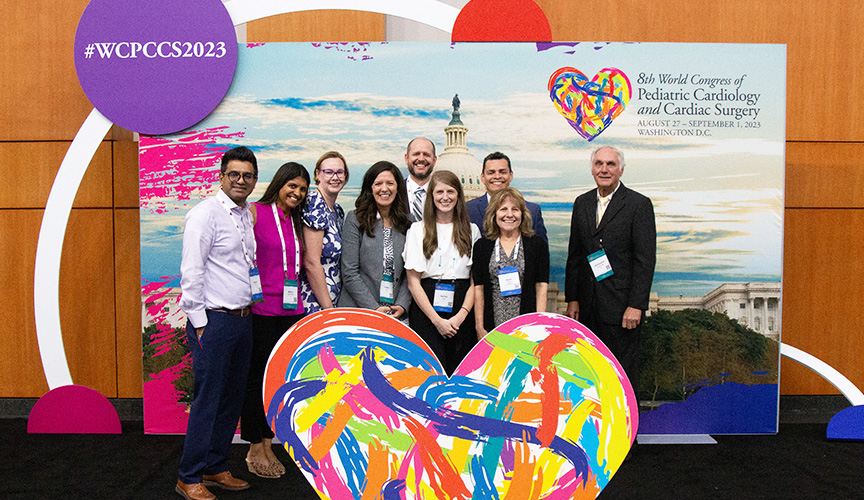
As a part of the World Congress, Le Bonheur’s Heart Institute had multiple experts who presented posters of their research. This included physicians, advanced practice nurses, fellows, residents and medical students, who all have worked on research to improve the care of children in Le Bonheur’s Heart Institute.
Neurodevelopment Outcomes Based on Timing of Transcatheter PDA Closure in Extremely Low Birth Weight Infants
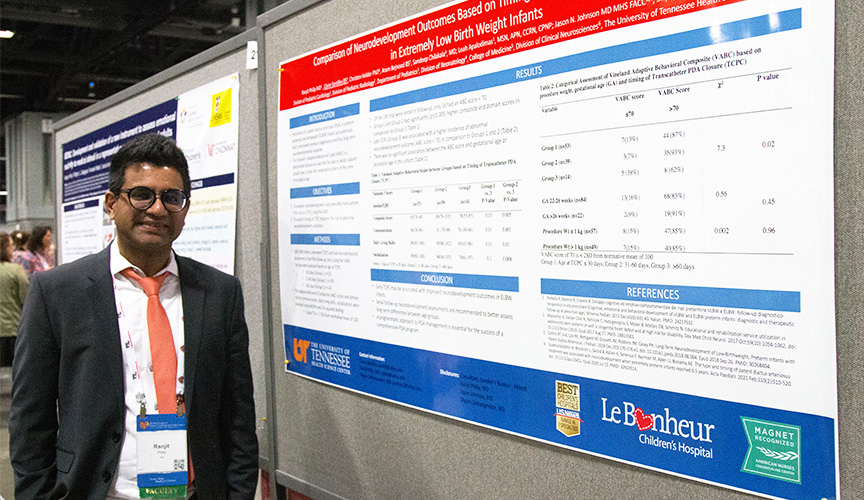
Le Bonheur Pediatric Cardiologist Ranjit Philip, MD
For extremely low birth weight infants with a large patent ductus arteriosus (PDA), a blood vessel in the heart that normally closes at birth, one consequence can be long-term neurodevelopment impact because of the decreased oxygen to the brain. Pediatric Cardiologist Ranjit Philip, MD, conducted a study that sought to find out if the timing of transcatheter PDA closure (TCPC) impacted the risk of a detrimental neurodevelopment outcome.
In this retrospective study, late TCPC (greater than 60 days of age) had a 38% higher incidence of poor neurodevelopment outcomes compared to younger age groups. Results showed that closing the PDA early makes a difference in the neurodevelopment of the child.
Impact of Boot Camp on Pediatric Cardiology Fellowship Training
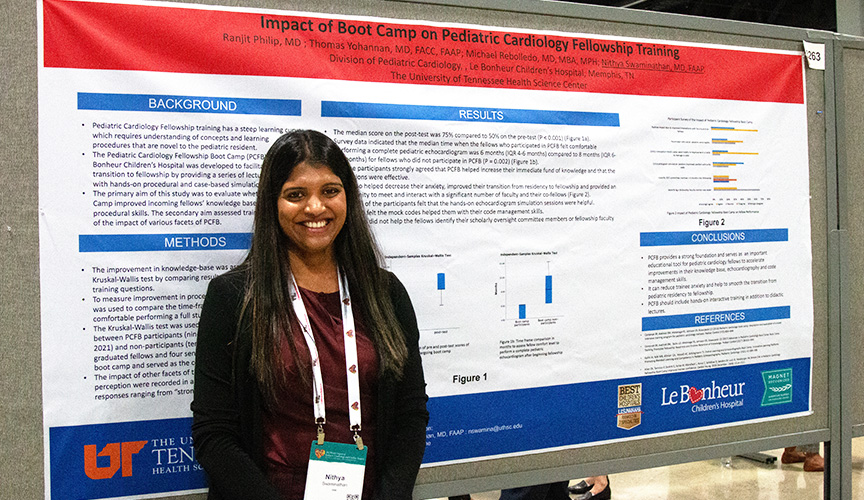
Le Bonheur Pediatric Cardiologist Nithya Swaminathan, MD, FAAP
Le Bonheur’s Pediatric Cardiology Fellowship Boot Camp was developed to facilitate transition to fellowship by providing a series of lectures with hands-on procedural and case-based simulations. Research from Pediatric Cardiologist Nithya Swaminathan, MD, FAAP, looked to see if the boot camp participants scored higher on a knowledge-based test and whether they were more comfortable during their transition.
Her results showed that the Pediatric Cardiology Fellowship Boot Camp provided a strong foundation for pediatric cardiology fellows to accelerate their knowledge and skills, including scoring higher on the post-test and reducing trainee anxiety during the transition from residency to fellowship.
COVID-19 and Out of Hospital Cardiac Arrest in the Pediatric Population
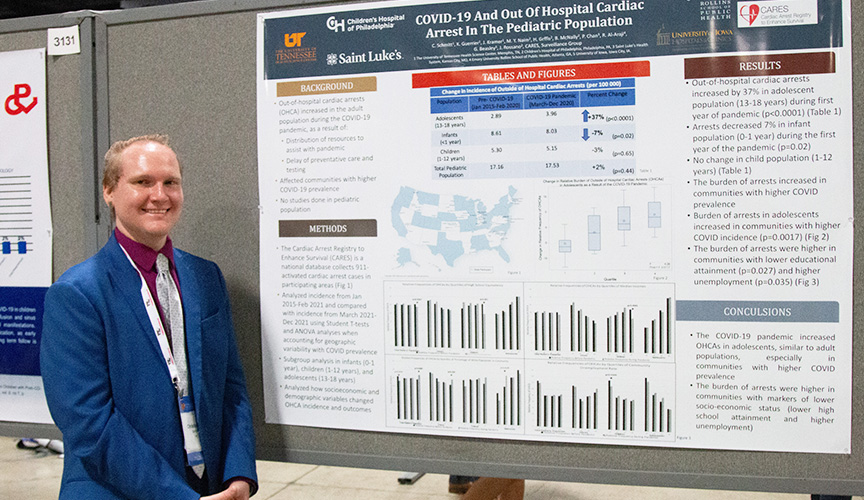
Le Bonheur Pediatric Cardiology Fellow Christopher Schmitt, MD
Out-of-hospital cardiac arrests (OHCA) increased in the adult population during the COVID-19 pandemic as a result of the distribution of resources to manage the pandemic and a delay in adults seeking preventative care and testing. Pediatric Cardiology Fellow Christopher Schmitt, MD, sought to review OHCA in the pediatric population by analyzing 911-activated cardiac arrest cases in infants, children and adolescents and then exploring how socioeconomic and demographic variables changed OHCA incidence and outcomes.
Results showed that OHCA increased by 37% in adolescents (13-18 years) and 7% in infants (0-1 years) with no change in children (1-12 years). Similar to adult populations, OHCA increased in communities with higher COVID prevalence and in communities with markers of lower socioeconomic status.
Off-Label uses of the Amplatzer Piccolo™ Occluder in Pediatric Patients with Congenital Heart Disease
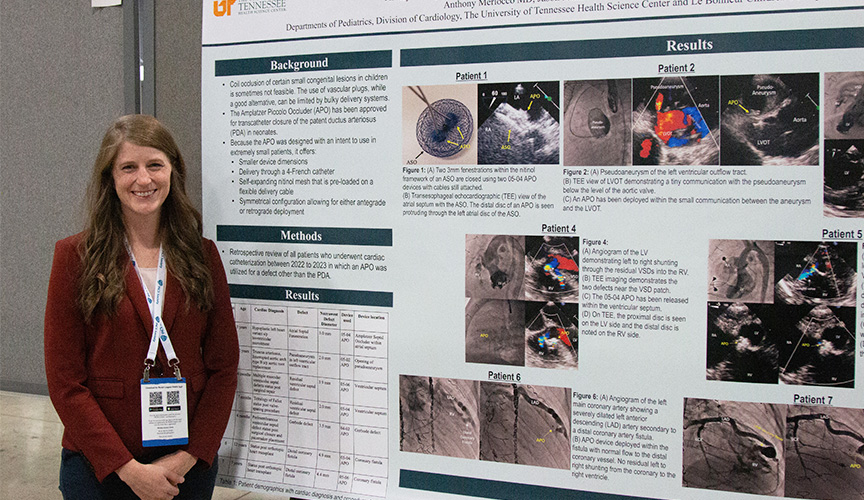
Le Bonheur Interventional Cardiologist Ashley Kiene, MD
The Amplatzer Piccolo™ Occluder (APO) device has been approved for the transcatheter closure of the patent ductus arteriosus (PDA) in neonates. Le Bonheur Interventional Cardiologist Ashley Kiene, MD, reviewed patients who underwent cardiac catheterization in which an APO was used for a defect other than PDA. Because the APO was designed for very small patients, it offers advantages in its delivery and size for other heart defects.
Kiene’s review showed that the device was successfully used in atrial septal defect, ventricular septal defect, coronary fistula and pseudoaneurysm, among others. The study found that APO has the potential to be an alternative to existing treatments and devices for these conditions.
Myocardial Fibrosis Improves in Young Patients with Sickle Cell Disease after Hematopoietic Cell Transplant
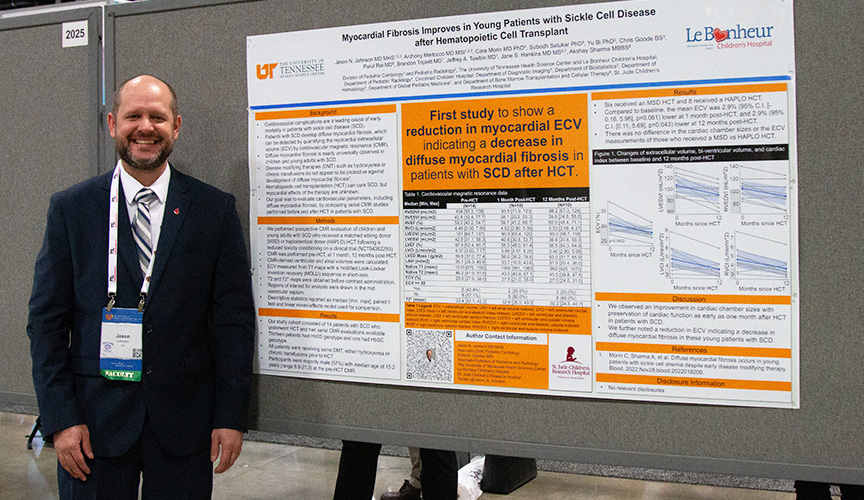
Le Bonheur Associate Chief of Cardiology and Director of Cardiac MRI Jason N. Johnson, MD, MHS
In collaboration with St. Jude Children’s Research Hospital, Le Bonheur Associate Chief of Cardiology and Director of Cardiac MRI Jason N. Johnson, MD, MHS, reviewed the MRIs of 14 patients with sickle cell disease (SCD) who underwent hematopoietic cell transplantation (HCT). Patients with SCD develop diffuse myocardial fibrosis, which can be detected by measuring the myocardial extracellular volume (ECV) via cardiovascular MRI. The goal of the study was to evaluate cardiovascular parameters, including diffuse myocardial fibrosis by reviewing MRI studies before and after HCT.
The results showed a reduction in ECV indicating a decrease in diffuse myocardial fibrosis in these patients. This is the first study to show such a reduction in SCD patients after HCT. Johnson says this means the heart is remodeling and shrinking back to typical size and function after stem cell transplant.
Outcomes of Paracorporeal Ventricular Assist Device Support in Infants with Congenital Heart Disease
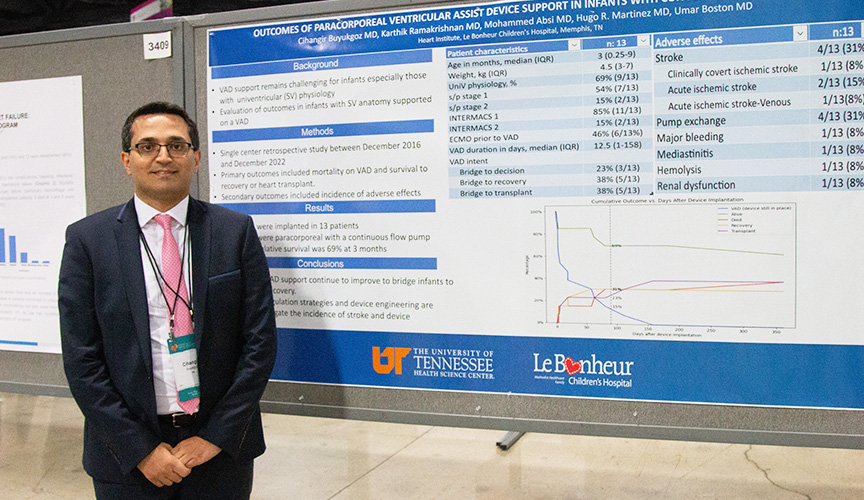
Le Bonheur Cardiology Fellow Cihangir Buyukgoz, MD
Ventricular assist device (VAD) support is challenging in infants but especially those with single ventricle defects. Le Bonheur Cardiology Fellow Cihangir Buyukgoz, MD, sought to evaluate the outcomes of infants on VAD with single ventricle anatomy. The primary outcomes he reviewed were mortality on VAD and survival to recovery or heart transplant, and the secondary outcomes included incidence of adverse effects such as stroke or pump exchange.
Thirteen patients were implanted with a VAD and the cumulative survival was 69% after three months on VAD. The technology available for infant VAD support continues to improve to bridge infants to transplant or recovery. Better anti-coagulation strategies and device engineering led to better outcomes and fewer adverse effects.
Help us provide the best care for kids.
Le Bonheur Children's Hospital depends on the generosity of friends like you to help us serve 250,000 children each year, regardless of their family’s ability to pay. Every gift helps us improve the lives of children.
Donate Now





